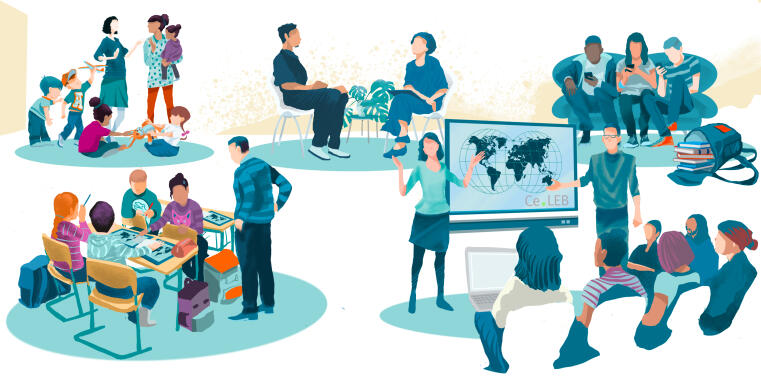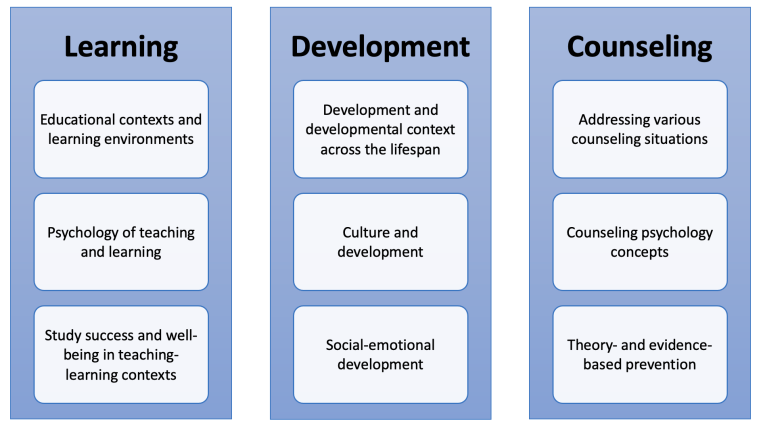

In the master's concentration in learning, development and counselling (LEB), students explore topics related to applied developmental psychology and educational psychology. In intensively supervised, small groups, they acquire theoretical and practical research knowledge, as well as practical skills in the conception and implementation of psychological counselling.
In the LEB-specific modules, cooperating professional practitioners are integrated into the courses through the Center for Learning, Development and Counseling (Ce.LEB) - the interface between research and practice. In this way, students are able to combine their theoretical knowledge with practical experience.
The courses deal with such topics as social-emotional development, cultural diversity, self-regulated learning and dealing with stress in the university context. Prof. Dr Joscha Kärtner from Developmental Psychology, and Prof. Dr Carola Grunschel from Educational Psychology are responsible for the content in the LEB concentration.
In addition, students acquire knowledge in psychological diagnostics, methodology and science communication together with students from the other master concentrations.
Click here to login to the Ce.LEB Instagram account.
For whom is the master’s concentration intended?
The master's concentration in LEB is a good choice for students who ...
- are interested in developmental and educational psychology topics.
- want to work in the fields of education, prevention, counselling, intervention and evaluation.
- have the desire to practically apply and deepen their theoretical knowledge during their studies.
- enjoy testing and developing theories in an application-oriented context.
- would like to conduct research on development- and education-related topics.
What career prospects does the master's concentration offer?
The master's concentration in LEB prepares students for a wide range of occupations in the fields of development, education, counselling, prevention, intervention and evaluation. Graduates can apply their expertise in the fields of academia and research, as well as in non-university contexts.
With respect to research, the focus is on developing theories for change processes in social contexts and finding solutions for practically relevant problems. The fields of application in non-university contexts include education and social services, health care, business and public service. LEB graduates are employed in independent, municipal and international contexts, e.g. as freelance trainers, psychological counsellors in school, educational and career counsellors, marriage, family and life counsellors, educational counsellors, counsellors for people with migration and/or refugee background, study counsellors, social paediatric counsellors, political counsellor and in educational monitors. More than half of our graduates work in counselling fields, and about one third work in research and teaching or adult education. Further information on the career paths of our previous LEB graduates can be found here.
Ce.LEB supports students on their way from university to professional life by offering career-oriented events (e.g. the LEBenswege practical training day), science-practice internships and the monthly LEB newsletter with current job offers.
What content is taught and how?

© Ce.LEB Students are required to complete two lectures and six seminars as concentration-specific courses. In the lectures, students acquire and reflect on knowledge of topics in applied developmental and educational psychology. In the seminars, students discuss central theories and methods in depth and work on teaching projects in small groups. They also provide opportunities for students to design, practically test and evaluate counselling services for theory- and evidence-based promotion of development as well as learning and teaching. Throughout the learning process, students receive intensive guidance and support from their instructors. A special feature of the LEB concentration is that cooperation partners from the field of education and counselling are always part of the courses. In this way, students already gain relevant, practical experience for later professional activities during their master's studies. The teaching projects are supported by the Center for Learning, Development and Counseling (Ce.LEB). In cooperation with practicing professionals and the public, Ce.LEB is keenly dedicated to counselling, informing and training. Furthermore, thanks to its intermediary function, Ce.LEB offers students the opportunity to establish contacts for internships and career entry. In addition to the LEB-specific modules, students receive in-depth training in psychological diagnostics, methodology and science communication together with students from the other concentrations.
Examination regulations, programme structure, performance overview and module handbook
The examination regulations contain all the rules and requirements for the MSc Psychology programme with a concentration in learning, development and counselling (LEB). The programme structure shows the ideal course of study. In the performance overview, you will find all required coursework and degree-relevant examinations which must be completed in order to graduate. Here, you can download the programme structure and performance overview. You will find descriptions of all the courses in the module handbook, which also contains the examination regulations.
What do students take away?
- extensive knowledge of life-long learning
- skills for theoretically-informed and evidence-based development of solutions to relevant problems in education and learning
- skills for ecologically valid research on change processes in social contexts
- a critical eye for culturally sensitive issues and diversity in society
- ideas for innovations in the educational system
- comprehensive counselling skills
- versatile practical experience
- communication and moderating skills
What do graduates have to say about the LEB concentration?
The master's concentration in LEB has been offered at the University of Münster since 2010. As a result, we have already built a large alumni network and have gained extensive insight into our graduates’ professional pursuits. Regular exchange (e.g. through guest lectures or invitations to networking meetings) and graduate surveys demonstrate that the master’s concentration in LEB is extremely versatile and relevant in preparing students for attractive careers in education, social services, healthcare, science, business and the public sector (e.g. police, administration, legal sector).
I can only heartily recommend the LEB master's concentration. The faculty members are exceptionally committed to the courses and the students.
Through my work, I have insights into other (seemingly) comparable degree programs in Germany and can say that the practical relevance that the LEB concentration in Münster offers far surpasses all other study programs I know of. At the same time, the basic subjects train you very well for research. So it’s a super mix that Münster offers.
Here I have learned to approach practical problems in an evidence-based way.
I owe a lot to the lecturers of the LEB concentration. I was given a great deal of freedom in designing my master's thesis, which in turn led to a doctoral project. I continue to benefit greatly from this academic qualification in my everyday professional life.
I felt fully prepared for professional practice after graduation and continue to benefit from the content of the degree.
Increased knowledge in the areas of educational and developmental psychology has helped me a lot in the job market. I am sure that I got my current job as a school psychologist also because of my broad knowledge I gained through the master’s programme.
The study programme gives you the tools and self-confidence to embrace your own ideas and implement them as a psychologist without additional training.
Application
Please see our information on the regular application process and on special cases in the application process.
Basically, you begin by applying for admission to the MSc Psychology programme. In the application portal, you should indicate which major you are interested in. If the number of students admitted to the MSc Psychology programme exceeds the number of study places available in this concentration, the study places are allocated by the drawing of lots.
